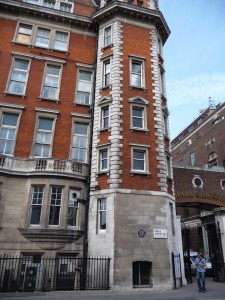Everyone knows about penicillin’s accidental discovery, but it wasn’t that accidental, and knowing the real story behind the ‘accident’ will add a great tool to your strategic planning toolbox. The truth is that Alexander Fleming was not an absent-minded, messy researcher but a brilliant strategist with habitual practices that made discoveries more likely. By adopting his practices, you will likewise make it more likely that good things will happen to your ministry!
What Really Happened in Fleming’s Lab

Fleming’s lab fills the tower bay. It is the middle level of the three vertical windows.

Wikipedia and other sites describe Fleming and his lab as untidy, messy, or cluttered, but if you visit the lab, which is set up exactly as it was in 1928, you will find out that what appears messy and cluttered is just another aspect of his experimental work. (Sorry, no pictures are allowed inside the lab.) The museum guide told me that when Fleming was done with an experiment (the experiment he intended to do), he always left samples of his experiment out for at least several days as an experiment to find something unintended that he obviously wasn’t looking for.
Another practice was to combine things just to see what happens. In 1921 he had a cold, and put some of his nasal mucous in a petri dish and saw that it dissolved the bacteria in the dish. He discovered a natural human antiseptic, lysozyme, which would have guaranteed his place in history even if he had never discovered penicillin!
Practices such as these made it possible for Fleming to be surprised by the unexpected. He was very intentional about creating opportunities for discoveries to be made. If this made his lab untidy or cluttered, so be it.
Furthermore, it wasn’t an accident that he just happened to notice something unusual in a sample. He always inspected the samples very carefully, and this time he noticed a clear spot on the slide where the bacteria that he was experimenting on should have been. The organism had been killed by something on this one part of the slide, and the killer agent turned out to be a mould that he first called mould juice and (wisely) later called penicillin!
The real story is that the discovery of penicillin was not so accidental. Fleming deliberately left the cultures out to allow time for something unexpected to happen. He deliberately inspected the samples to see what, if anything, had developed. He deliberately followed up an unexpected observation to find an explanation for it. And he deliberately invested time to think about the implications of what he had discovered. Anyone who does what Fleming did is likely to discover something sooner or later.
In summary, Fleming’s method was:
- Create opportunity to be surprised.
- Be on the lookout for surprising things.
- Be curious about the surprises you find.
- Look for ways to take advantage of the surprises.
My Discovery Using Fleming’s Methods
Although I did not realize I was using Fleming’s methods at the time, I discovered the idea for this post following the same principles as Fleming. It was no accident that I stumbled upon the lab that led to the story that inspired this post. Here’s an example of Fleming’s method at work:
Create Opportunity to Be Surprised
- I was on a layover in London while returning home from Zürich on the last leg of my round-the-world sabbatical trip. I had not intended to visit the lab, but I had made the decision to make the most of my time on this once-in-a-lifetime trip by taking every opportunity to explore. So when I had two extra hours available before I needed to leave for Heathrow airport, instead of killing time at the airport or the hotel I got out my GPS and looked to see what tourist attractions were nearby. Fleming’s lab was the closest attraction and it was only a mile a way. Using the GPS as my guide, I walked to St. Mary’s Hospital and found the museum.
Be on the Lookout for Surprising Things
- As the guide told the story of Fleming’s discovery, he made it clear that Fleming had deliberately left the cultures out after he finished his experiments with them. He said it was not a case of being messy, but that this was his usual practice. That I found surprising.
Be Curious about the Surprises You Find
- I had never heard this aspect of the story before, so I asked why he would do that. That’s when I heard about his looking for the unexpected. This was a surprising idea because I thought scientists always had some concept of what they were looking for, an hypothesis to prove or disprove. Simply putting something ‘out there’ to see what happens is quite different from the scientific method I learned in high school.
Look For Ways to Take Advantage of the Surprises
- I was not expecting to find something to blog about in that two extra hours I had, but as I heard the true story behind the discovery of penicillin I realized I had accidentally discovered a great leadership practice just as Fleming accidentally discovered penicillin and I should share it on this blog.
My ‘Accidents’ at CCCC
When I arrived at CCCC in September 2003, I decided to provide leadership that was open to opportunity. In fact, we would search it out. I decided that we would be willing to shift priorities based on comparing new opportunities with our current action plan. To make this happen, the board and staff were told our action plans were simply default plans that we would follow as long as nothing better came up. Then staff performance review criteria were set based on exhibiting our team values rather than reaching pre-set goals. That way we could be flexible and nimble. Here are a few examples of how that has worked out:
- CCCC sponsors the Best Christian Workplace survey in Canada, and it all started because I just ‘happened’ to be attending a conference in the States where I saw the second annual presentation of awards for the American Best Christian Workplace survey. But I was at the conference because I was looking to see what’s new and different, so I set the stage for opportunity. I immediately connected what I saw with what I thought Canadian ministries needed because I was already on the alert for new ideas. Within a couple of weeks, we had an agreement to do it in Canada. I took action on an idea instead of just thinking, “That was interesting.”
- CCCC was a partner in the 35<35 program that recognized young Christian leaders because I just ‘happened’ to run into Carson Pue in a hotel hallway. But I attend EFC’s Presidents Day each year because it is the best place for me to meet a lot of ministry leaders at one time when I have no responsibilities of my own to attend to. I was open to some collaborative work and wanted to talk with as many people as I could about what they are doing. When Carson Pue and I crossed paths, we chatted a bit and when he asked what was on my mind, I told him we wanted to do something to recognize and encourage young Christian leaders at our next conference. Wouldn’t you know it, he was wanting to find some partners to promote young leaders too and he had the idea for the 35<35 recognition program. That turned out to be a great success for both of us (and Bridgeway Foundation and Christian Week—our other partners in that program).
- Jerry White, International President Emeritus of The Navigators, is probably the highest ranked speaker we’ve ever had at our conference. I ‘happened’ to have a personal connection with him that made me think of him as a speaker. But I didn’t just ‘happen’ to meet him. While writing my first doctoral research project in 2005 I was critiquing his 1983 book on my topic and I wondered if this author were still alive. I tracked him down, and since then we’ve met a couple of times and had some phone calls, and he ended up not only speaking at the CCCC conference but also writing the foreword for my new book, The Church at Work. Lots of good has come about because I didn’t just read and critique a book but took the additional step of contacting the author, not knowing at the time what was going to come of it. I had no expectations at the beginning that anything would develop. I just thought Jerry would be an interesting person to talk with and get to know. But that created the environment in which other good things could develop.
- Our horizons at CCCC are rapidly expanding as other staff members are also creating intentional opportunities for ‘accidental’ discoveries!
Creating Intentional Accidents at Your Ministry
How much do you leave out to see “what might happen?” In what ways do you create opportunity to be surprised? To find opportunity you did not know existed? Do you have an intentional plan to find the unexpected? Some things you could do are:
- Talk with people outside of your usual circles who might introduce a new idea from their sphere into your sphere.
- Investigate what beneficiaries or clients do outside of your programs that might affect your program design.
- Read a good book like The Eureka Effect, to stimulate your creativity.
- Encourage your team to experiment on their own and be willing to try a small-scale pilot project.
- Visit unrelated ministries doing a different part of the Christian mission and find out what’s new with them.
- Just tell everyone you meet what your ministry does. The more people who know about you, the more you are likely to hear about opportunities.
- If you have field staff, pay close attention to what they are actually doing. You’ll probably find a lot of good creativity on the front lines!
- And of course, pray hard that God would bring unexpected opportunities your way!
You can never know in advance, of course, what will be discovered by following a strategy of intentional accidental discoveries, but that’s the fun and amazing part of it! All you know at the start is that discoveries will be more likely because you have put yourself in a place that is conducive to discovery. You won’t believe what good things will happen once you set the ball in motion by stepping outside of your zone. Just watch what develops!
I’m sure I’ve only scratched the surface of how to make accidental discoveries more likely. Please add your own ideas.


